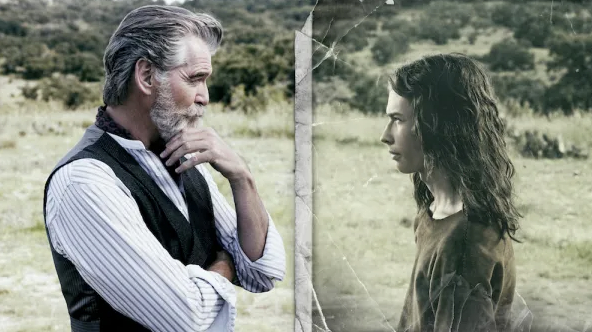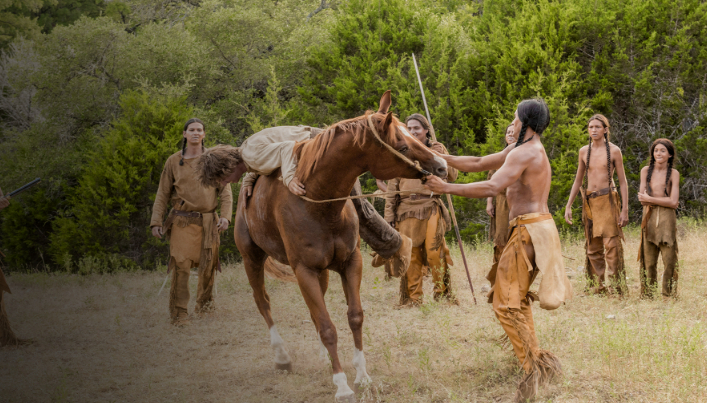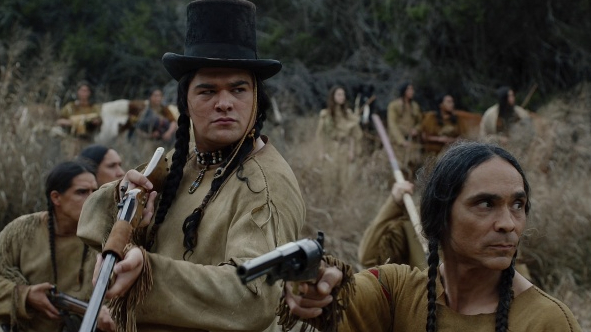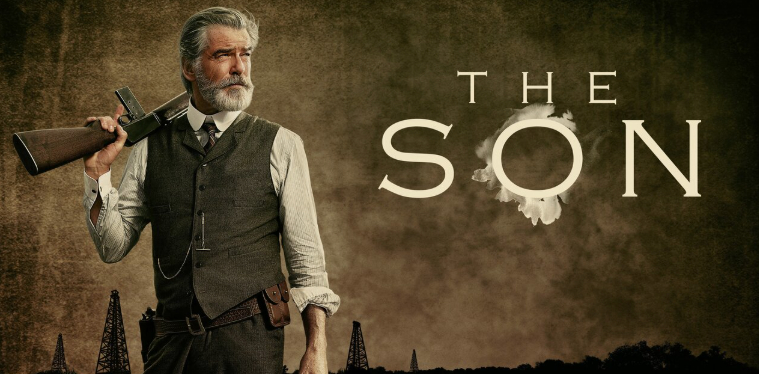The Son (2017)
A sweeping, multigenerational epic, The Son blends the turbulent history of early Texas with intimate, character-driven storytelling. Adapted from Philipp Meyer’s acclaimed novel, the series charts one family’s ascent from the frontier’s ruthless lawlessness to the dawn of the oil age—and the moral decay left in its wake.
⏳ Dual Timelines, Singular Vision
The narrative unfolds in two distinct eras:
- 1849: Thirteen-year-old Eli McCullough is captured by the Comanche after a brutal raid kills his family. Raised among the tribe, he learns their ways—and learns to survive.
- 1915: Now a formidable cattleman turned oil baron in South Texas, a hardened Eli struggles to preserve his legacy as war, ambition, and betrayal threaten everything he’s built.
This parallel storytelling enriches the series’ central themes: the cost of survival, the shaping of identity, and the brutal legacy of violence.

🎭 Pierce Brosnan’s Transformative Lead
Pierce Brosnan surprises as the older Eli McCullough—a man shaped by trauma, molded into a visionary, and haunted by his own brutality. His evolution from frontier captive to aristocratic patriarch is compelling, and he captures the character’s complexity with subtlety and grit.
Jacob Lofland records a haunting performance as young Eli, his haunting transformation from frightened boy to a driven survivor setting a strong foundation for Brosnan’s portrayal.
Supporting cast members—including Zahn McClarnon as the Comanche leader Toshaway and Henry Garrett as Eli’s son Peter—add depth to family and cultural conflicts that shape the McCullough dynasty.
🎥 Rich Visuals & Authentic Atmosphere
Filmed on location in Texas, the series excels in atmosphere. Wide-open skies, sun-drenched plains, and dusty towns evoke the raw beauty and harshness of the frontier. The contrast between the organic wildness of the Comanche era and the industrial grit of the oil boom is vivid and purposeful, reinforcing the show’s shifting moral landscape.
Episodes reveal meticulous attention to historical detail—from Comanche rituals to early drilling rigs—enhancing the world’s authenticity and turmoil.

↔️ Power, Family, and Moral Ambiguity
At its core, The Son is a tale of power’s inheritance—and corruption. Eli’s ambition pushes him past the line of survival into moral decay. His decisions echo through generations, fracturing familial relationships and poisoning the land he hoped to tame.
The series wrestles with themes of colonialism, legacy, and identity—challenging viewers to ask whether violence passed down becomes destiny or a burden to be broken.

❌ Not Without Flaws
- Pacing issues: The early episodes can feel slow, especially as the series balances two timelines and numerous subplots. Viewers drawn to rapid narrative progression may find it demanding.
- Shallow secondary characters: While Eli and Peter are richly developed, some supporting roles—as family members or business partners—lack nuance.
- Familiar tropes: Critics have noted that The Son occasionally relies on well-worn Western drama conventions without subverting them, making certain arcs predictable.
🌟 In Summary
The Son is a captivating, character-rich tapestry of American evolution—one that confronts brutality, legacy, and the cost of ambition. With standout performances and immersive production, it’s a must-watch for fans of prestige Westerns with moral bite.

Overall Rating: ★★★★☆ (4/5)
🔎 Who Will Love It
- Viewers who enjoy deep character journeys and Western landscapes
- Fans of historical sagas driven by legacy and moral conflict
- Those who appreciated shows like Deadwood, Godless, or Hell on Wheels
🎯 Who Might Hesitate
- Viewers seeking fast-paced or plot-heavy storytelling
- Those preferring fully redemptive or hero-driven Westerns
- Anyone uncomfortable with the show’s themes of colonialism and violence
The Son is not just a story about oil and power—it’s about the human cost of America’s rise, the shadows that linger over family, and the truths we choose to remember—or bury.
